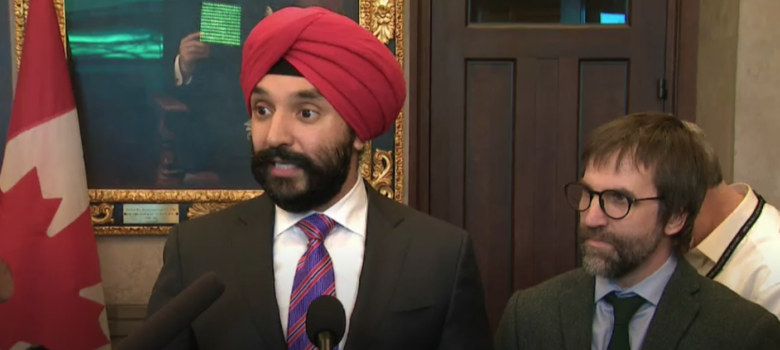Canadian Heritage Minister Steven Guilbeault continued his media tour in support of link taxes and Internet content regulation yesterday with interviews in the Toronto Star and Radio-Canada. The Toronto Star compares technology companies to polluters, doubles down on calling social media linking to news articles without a licence “immoral”, questions why Facebook has said it will stop news sharing in Australia with mandated licensing (“I’m like, really guys”), and raises the possibility of using copyright to require payments for linking. In the Radio-Canada interview, he admits that Netflix already invests in Canada (CRTC chair Ian Scott says it is the biggest single contributor to film and television production in Canada) but that he wants regulation to raise hundreds of millions of dollars to support francophone, native, and minority community productions.
I’ve written extensively on why the claim that linking without a licence is immoral is wrong, why Facebook is right to push back against link licensing, and how Canadian film and television production is enjoying record success because of international streaming services, not in spite of them. But there is one line in the Radio-Canada that particularly caught my attention. When asked about the timing of a bill to mandate online Cancon, Guilbeault acknowledges that “obviously I am not the only minister [responsible] for the bill.”
While Guilbeault says that it is obvious, given that he has dominated the news cycle on these issues, it probably isn’t obvious to all. Indeed, it begs the question of why Innovation, Science and Industry Minister Navdeep Bains has been largely silent on issues that are critical to his portfolio and emphasis on innovation. The two ministers shared the stage with the release of the Broadcasting and Telecommunications Legislative Review panel report and their ministerial mandate letters (Bains, Guilbeault) make it clear that many of these issues are a shared responsibility. For example, on Internet content regulation both mandate letters have the identical wording (save for substituting the other minister). The Bains letter:
Co-lead work with the Minister of Canadian Heritage to modernize the Broadcasting Act and the Telecommunications Act, examining how best to support Canadian content in English and French and ensure quality affordable internet, mobile and media access.
Work with the Minister of Canadian Heritage to introduce legislation by the end of 2020 that will take appropriate measures to ensure that all content providers, including internet giants, offer meaningful levels of Canadian content in their catalogues, contribute to the creation of Canadian content in both Official Languages, promote this content and make it easily accessible on their platforms. The legislation should also consider additional cultural and linguistic communities.
With the support of the Minister of Canadian Heritage, create new regulations for large digital companies to better protect people’s personal data and encourage greater competition in the digital marketplace. A newly created Data Commissioner will oversee those regulations.
Work with the Minister of Canadian Heritage to review the Copyright Act.
These issues touching on Internet regulation, copyright reform, and online competition, engage both portfolios and both ministers have been mandated to address them. Guilbeault may think of Internet companies as akin to environmental polluters, but is that view shared by Bains? If not, it is time for the Innovation, Science and Industry to speak out and live up to his own mandate letter.








Why stop at a link fee. How about a spoof fee. I want Bell, Rogers and Telus to pay me for every phone call I get from a spoofed number. Once the legislation is in place I’ll make sure my number is on as many call lists as possible then I’ll sit back and wait for the money to roll in.
Pingback: ● NEWS ● #MichaelGeist #Internet #copyright ☞ As #Heritage Minister… | Dr. Roy Schestowitz (罗伊)
Pingback: News of the Week; September 9, 2020 – Communications Law at Allard Hall
The internet is based on linking. Linking is NOT stealing or copying content (for which copyright laws are already in place). To mutate the copyright law this way, would be the same as saying I have to pay Shoppers Drug Mart, for sending a neighbour there for some aspirin.
Industries have to evolve, when faced with challenges of evolving technological or social landscapes. Online publishers however, decided to pack the pockets of weak-minded and morally ambiguous politicians to restore their profit margins at any cost.
Linking to sites already helps those sites’ content. Firstly, through promoting more visits to that content (where the publisher can figure out how to monetize, etc.). Secondly, through search rankings and SEO credibility. Why would you charge people for promoting your content?
This is insane.
Ideally, taxes are necessary so that the state can realize the social goals that are the reason for the existence of all democratic societies. We are talking about the quality of life of citizens, health, level of education and well-being of the nation. there is more information about this here https://patch.com/california/los-angeles/hcr-wealth-advisors-art-helping-smartly . In addition, by giving a part of our income to the budget, we are essentially accomplices in creating a favorable environment for life. We invest in national security, road construction, anti-poverty programs, and education.